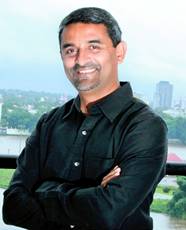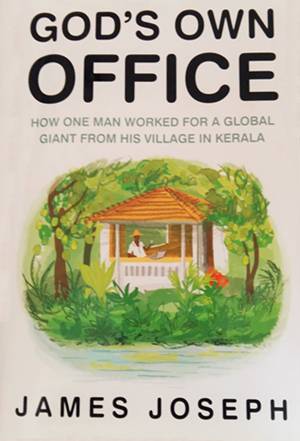From the Big Apple to the humble jackfruit
17 Jun 2015
 James Joseph is the founder of Jackfruit365, which is an initiative to create an organized market for jackfruits in India. A corporate professional, who worked for 25 years in North America, Europe and India, at Microsoft, 3M, and Ford Motors, he was the director, executive engagement, Microsoft, and was responsible for strengthening the company's relationship with senior executives of the top 200 enterprises in India. Before this he was responsible for manufacturing industry marketing for Microsoft in the UK. Joseph is also a recipient of several awards including the Microsoft's highest award, Circle of Excellence, the and the Start-Up Entrepreneur of the Year instituted by TiEcon Kerala.
James Joseph is the founder of Jackfruit365, which is an initiative to create an organized market for jackfruits in India. A corporate professional, who worked for 25 years in North America, Europe and India, at Microsoft, 3M, and Ford Motors, he was the director, executive engagement, Microsoft, and was responsible for strengthening the company's relationship with senior executives of the top 200 enterprises in India. Before this he was responsible for manufacturing industry marketing for Microsoft in the UK. Joseph is also a recipient of several awards including the Microsoft's highest award, Circle of Excellence, the and the Start-Up Entrepreneur of the Year instituted by TiEcon Kerala.
In an interview with Swetha Amit, he talks about his book God's own office, his journey from unbundling himself as a corporate professional to emerging an entrepreneur and cheerleader of the nutritious, if humble, jackfruit.
God's own office is a rather catchy title. What was the inspiration behind this book?
As part of my additional role as the local ambassador for Microsoft in my home state Kerala, I attended NASSCOM executive committee interactions with the chief minister of Kerala.
A comment by then NASSCOM chairman, Rajendra Pawar, was the trigger for the title God's Own Office. Mr. Pawar said if 70 per cent of God's Own Country's youth leave the state for jobs every year, the state will eventually become a place only for the elderly. from God's Own Country to God's Own Nursing Home is somewhat the future he predicted. The only way to stop this, he said, was to attract middle level managers of Keralite origin back to Kerala who can hire and train another 10 fresh graduates every year. So I felt God's Own Office would be an apt title for my book meant to inspire and guide middle level managers to return to their hometowns with their job.
The inspiration came from Kris Gopalakrishnan of Infosys. I was speaking at a CII function in Kochi when Kris was the president of CII South. I shared my joy of working for India and living in Bharat and at the speakers lounge Kris suggested I document my experience so that more young professionals could benefit. He felt many are stuck in 90 minutes of traffic everyday in the Metros and could have a much better quality of life in smaller towns.
Yours is an interesting journey where you transitioned from the corporate world of a global giant to Microsoft to the humble world of a jackfruit, which changed the course of your life. So what prompted you to take this road less travelled?
The jackfruit venture was an accidental outcome of this book. While I started writing the book from the attic of my cottage, I could see the jackfruit tree in our backyard. In two months the first fruit grew to 15kg in front of my eyes and I tried to make a burger with it, which eventually led to Jackfruit365. This accidental entrepreneurship is detailed in the book.
A jackfruit isn't exactly popular with chefs in India due to its unavailability round the year. So what made you choose this unique fruit as your business prospect?
Yes, it's true. The ''sticky, smelly seasonal'' jackfruit is not that popular with chefs in India. At the same time 80 per cent of jackfruits worth Rs2,000 crore in India go waste every year. More importantly they go waste in extreme summer when all other crops fail.
According to Dr. Narayana Gowda, former vice chancellor of Karnataka University of Agricultural Sciences, creating an organised market for jackfruit could act as a shock absorber against farmer's suicides in India, with a supplement income when other crops fail. And, finally, it is one of the healthiest and most fibre-rich plant-based foods available on earth. I was able to come up with a solution to make the edible portion of the jackfruit in a ready to cook form with 365 days shelf life. The chefs loved it. The cause behind creating an organised market made me choose this unique fruit as my business prospect.
How far did your global experience help in your new start-up venture? How did you manage the logistics of supply chain management while operating out of a small town?
My global experience of always looking at a problem from the customer's point of view helped me with the venture. The industry contacts I built over the years helped me find mentors in areas where I didn't have the expertise and with their help I was able to find the right partners to manage the supply chain.
Could you tell us more about the benefits of jackfruit, being a propagator of this king of fruits?
Jackfruit was always known as one of the most nutritious foods, however not easy to prepare as I just explained. Due to the high fibre content, it is sometimes called as the bottle brush for the intestines. However the most recent discovery for me is with the raw jackfruit, the meaty flesh around the seed before it turns ripe. Like raw mango it is not sweet and doesn't have any aroma of the ripe one at all. It is used to prepare a meal in Kerala and Sri Lanka. At this stage, raw jackfruit is low in calories, carbohydrate and high in dietary fibre most of which is insoluble fibre. Evidence suggests this can reduce insulin dependency as the sugar levels do not rise as much as with rice or wheat.
 | |
| Price:Rs 399 / Publisher: Penguin Books India / Genre: Non-Fiction / Business |
You have talked a lot about being a big fish in a big pond to a small fish in a small pond. How do you explain the advantages and disadvantages of both these worlds?
By big fish in a big pond, I mean performing our best in the professional world to satisfy our intellect, while being a small fish in a small pond is the idyllic world living as a normal villager in a small place surrounded by nature, spirituality, many generations of friends and family and a farm.
The latter is for our spirit. An example the contrast would be that in the big pond one morning I bump into Steve Ballmer at the gym of a hotel in Hyderabad where I am organising a meeting for Microsoft, while being in the small pond would be the morning I am with my daughter buying a fresh catch of fish directly from the fisherman from the river next to our place.
From working in a cubical to setting up your workplace in a desolate backwater retreat in God's own country must have come with its own set of challenges. What were the adjustments you had to make and how did you overcome these challenges?
It requires a lot of discipline and fail-proof infrastructure. But it is not that difficult and not at all expensive. The bulk of my book is about these practical tips on how I managed without most of my colleagues even noticing that I actually moved from Bangalore to a village in Kerala even after a year. In addition my cost of living came down by 30%.
Working in Gods own office comes with its own set of distractions. So how do you manage to stay motivated and maintain focus?
I have a section "Recharge" in my book. Location is very important; you must have a constant source of positive energy when you work alone. Once you get a taste of what I call the real ''work-life resonance'' where your life and work are operating at their natural frequencies, you will stay focused and motivated to keep it that way
How do you think has the concept of working from home picked up in India over the years?
We are still way behind compared to my experience in US and UK. As the traffic situation in the metros gets even worse, we will see India catching up with this. I have received a lot of great feedback especially from mothers wanting to restart their career. Working from home on Fridays would be a great way to practice this in the beginning and once employees prove they are equally effective, managers should be more open to it.
Lastly what are your future plans?
For the foreseeable future, it is jackfruit, jackfruit and jackfruit, till I have enough experience to write another book about the jackfruit!
| Excerpt from God's Own Office Why big corporations should embrace God's Own Office Let's be honest, nobody really craves working from home. Given a choice, we would all like to have a Chinese wall between our 'sweet home' and the 'hot seat' in our office. By working from home you become this weird person for your family who is there but not approachable, with your head constantly buried in the laptop and shouting at someone they can't see. In India, you have the additional headache of setting up multiple levels of backup for broadband, electricity, etc. at your home. The very low percentage of employees currently availing this option validates this point. So, who really works from home / remote location? There are three categories of people-the creative, the subject-matter experts and the unfortunate with a personal family situation. The Creative: These are the kind of employees who need a lot of Oxygen for their creative energy to flow; they will gravitate towards the best place where they can be most creative. The best example of this is the late Verghese Kurian of Amul Cooperative. When the Indian government offered him the plum post to head the National Diary Development Board (NDDB) in Delhi, he refused. His main source of energy was the farmers of Anand in Gujarat and, eventually, the government moved the headquarters of NDDB to Anand to make India self-sufficient on milk. The Subject-Matter Experts: Or The Artisans, as Tom Friedman and Michael Mandelbaum describe them in their book, That Used to be US. These people possess a unique skill set or knowledge that they have acquired and refined over a long period of time. They worked really hard and sacrificed a lot of time away from family in the initial years to reach the artisan stage and now, every piece of work or project they do has a unique signature style, which no one else can replicate easily. |


















